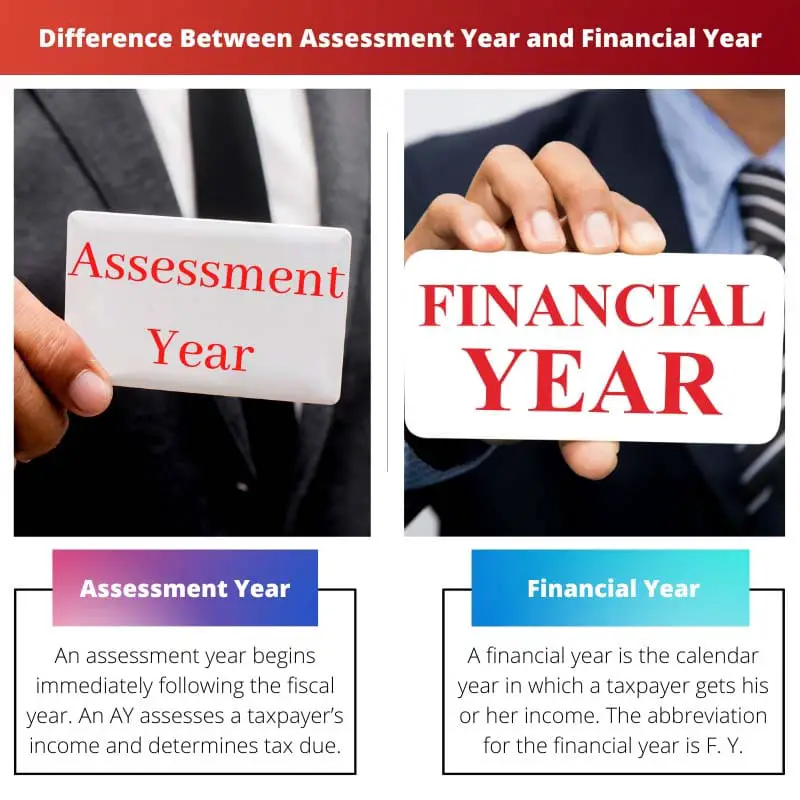The phrases “assessment year” and “financial year” are two very different and important concepts that taxpayers must understand.
There will be no accurate communication if the assessment year or fiscal year is incorrectly referred to. The words “Assessment Year” and “Financial Year” have been used in Income Tax for a long time.
Nonetheless, many people are perplexed by the distinction between these two phrases. Many assessors and taxpayers confuse the two phrases, which causes a slew of issues when it comes to submitting income tax reports.
Key Takeaways
- The assessment year is when income earned in the financial year is assessed and taxed, while the financial year is the 12-month period during which income is earned.
- An assessment year starts on April 1st and ends on March 31st of the following year, while the financial year begins on April 1st and ends on March 31st of the same year.
- Taxpayers file income tax returns for the income earned during the financial year, which is then assessed by tax authorities during the assessment year.
Assessment Year vs Financial Year
The difference between assessment year and financial year is that an assessment year is a year immediately afterward a financial year. It is essentially the period in which the money gained throughout the financial year is evaluated. On the other hand, from the standpoint of basic income-tax filing, the financial year is simply the one in which a worker or taxpayer generates an income.

An assessment year begins immediately following the fiscal year. An AY assesses a taxpayer’s income and determines tax due.
The money you made during the financial year under the various categories of income is taxed and assessed during the assessment year.
Citing your A.Y. has been regarded as crucial since mentioning an inaccurate AY results in an improper financial year.
An improper fiscal year indicates that you earned the money in a different year and are paying any taxes for a year in which you did not earn that revenue.
A financial year is the calendar year in which a taxpayer gets his or her income. The abbreviation for the financial year is F. Y.
As a result, a financial year is a timeframe during which a paid person earns their salary, a corporation or expert incurs costs and profits, a capital gain or loss happens on the sale of a financial asset, a taxpayer receives other income, and a housing property generates rental revenue.
Comparison Table
| Parameters of Comparison | Assessment Year | Financial Year |
|---|---|---|
| Meaning | Income earned is taxed | Earns the income |
| Synonyms | A.Y | The previous year, Fiscal year and F.Y |
| Evaluation of income | Yes | No |
| Role of taxpayer | A self-assessment tax can be paid by a taxpayer. | A taxpayer has the option of paying advance tax |
| Tax planning | Any investment made by the taxpayer cannot be deducted from his or her taxes. | During or before the financial year |
What is an Assessment Year?
The assessment year is the year following the previous year in which the preceding year’s revenue is evaluated, taxes are collected, and ITRs are submitted.
Because revenue for any fiscal year is computed and taxed by next year, the assessment year is included in the examination near income tax filings.
Income cannot be taxed until it is received. Adverse conditions can occur at any moment of the year, whether at the beginning, middle, or end.
As a result, while completing income tax returns, the assessment year must now be selected. Tax calculation necessitates the assessment and payment of taxes.
All of these processes take place in the year after the year in which taxes are collected.
When submitting an income tax return, if you provide a wrong AY, you will also enter an inaccurate fiscal year. Because the assessment year and financial year are intertwined.
For example, suppose you wish to choose the assessment year for the fiscal year 2020-21. AY 2021-22 is the correct AY.
However, if you choose an erroneous AY, such as AY 2020-21, you will be selecting FY 2019-20. And you’re on your way to assessing revenue generated in the wrong fiscal year.
Filing tax returns throughout the assessment year requires taxpayers to be as honest as possible about their past tax payments, the numerous forms used for paying tax, and the receipt from the income of filing tax online.
If you choose the erroneous assessment year on your income tax return, you will be required to file the ITR for the correct assessment year. The tax department will levy a penalty for failure to file a tax return.
There are repercussions if you make an error in choosing the optimum assessment year while paying self-assessment tax and advanced tax.
To begin, you must re-pay the self-assessment tax for the proper assessment year. Furthermore, you must request a refund of the tax you paid for an erroneous assessment year.
You must pay interest on the tax that was not paid on time. And if you do not recognize your error, the interest amount will continue to rise daily.

What is a Financial Year?
A financial year is a one-year term used by businesses and governments for accounting and financial and planning purposes.
A financial year is most commonly used in accounting to generate financial accounts. Although a financial year might begin on January 1 and finish on December 31, not all financial years coincide with the calendar year.
Universities, for instance, frequently begin and conclude their fiscal years per the academic year.
Corporations and their investors value knowing a company’s fiscal year since it helps them to precisely assess sales and profitability year over year.
Companies can be either calendar year or fiscal year taxpayers, according to the Internal Revenue Service (IRS).
A financial year is a twelve-month term that corresponds to a company’s financial reporting periods. It may differ from a calendar year on occasion.
Accounting considers financial years to be essential since they are engaged in federal financial records, budgeting, and income reports.
Using a financial year may be advantageous for businesses that operate on a seasonal basis. This is because it may provide a more accurate portrayal of the company’s operations, allowing revenues and costs to better align.
For instance, it is common for retail businesses to end their financial year on January 31, marking the end of the Christmas season. Walmart and Target are two of the most prominent firms that use this fiscal year.
Main Differences Between Assessment Year and Financial Year
- Profits generated during the financial year are taxed during the assessment year. Meanwhile, in a financial year, a taxpayer generates money under numerous headings.
- The assessment year is sometimes shortened to A.Y., whereas the financial year is also recognized as the fiscal year, F.Y., and previous year.
- In the assessment year, the income generated the previous year is taxed and assessed. An income earned in the financial year is not assessed since it is still being earned.
- A taxpayer can pay self-assessment tax on income earned in an assessment year, whereas a taxpayer can pay advance tax on income earned and expected to be generated throughout the financial year.
- Any capital investment during the assessment year cannot be claimed as a tax deduction by the taxpayer. Even though the taxpayer expected to invest for the financial year. Any investment made after then will be recognized as an investment for the next financial year; however, any tax planning must be done during or before the financial year.

- https://www.bmj.com/content/340/bmj.c1898.full
- https://www.sciencedirect.com/science/article/pii/S074857510800016X
